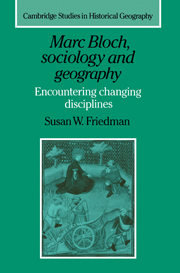Book contents
- Frontmatter
- Contents
- List of tables
- Acknowledgments
- A note on translation
- List of abbreviations
- Introduction
- 1 Marc Bloch and the “Université”
- PART I Sociology, geography, and history during Marc Bloch's years of apprenticeship
- PART II Marc Bloch as a critic and practitioner of sociology and geography
- 6 The University of Strasbourg as a center of disciplinary change
- 7 Kings, serfs and the sociological method
- 8 Reflections on the geographical approach and on the agrarian regime
- 9 An expanding view: Marc Bloch's later projects
- 10 Towards a reworking of the historiography of Marc Bloch
- Notes
- Index of names
- Subject index
- Cambridge Studies in Historical Geography
7 - Kings, serfs and the sociological method
Published online by Cambridge University Press: 23 November 2009
- Frontmatter
- Contents
- List of tables
- Acknowledgments
- A note on translation
- List of abbreviations
- Introduction
- 1 Marc Bloch and the “Université”
- PART I Sociology, geography, and history during Marc Bloch's years of apprenticeship
- PART II Marc Bloch as a critic and practitioner of sociology and geography
- 6 The University of Strasbourg as a center of disciplinary change
- 7 Kings, serfs and the sociological method
- 8 Reflections on the geographical approach and on the agrarian regime
- 9 An expanding view: Marc Bloch's later projects
- 10 Towards a reworking of the historiography of Marc Bloch
- Notes
- Index of names
- Subject index
- Cambridge Studies in Historical Geography
Summary
At the University of Strasbourg, Bloch found himself in a dynamic atmosphere at an institution that was more open to sociology, the study of religious phenomena, and interdisciplinary exchange than any other university in France. With an excellent appointment and his doctorate soon out of the way, he finally had the freedom to pursue his sociological interests in earnest. In substantive writings on the thaumaturgic kings and the transformation of serfdom, he began to employ some Durkheimian concepts and to explore such topics as rites, collective beliefs, social classifications and the role of language. As his career advanced, Bloch also had the chance to address some of the methodological concerns raised by such studies more directly – reviewing other works on social class, writing on the comparative method, and criticizing the work of particular Durkheimians. Throughout, he addressed many of the same issues that figured in the pre-war debates between sociologists and historians, although the Durkheimian school, decimated by war, no longer had the same presence.
During February, 1919, while on a trip with Charles-Edmond Perrin to the Lower Vosges, Bloch spoke of his research plans for the future. Both were still mobilized and on temporary assignment to the University of Strasbourg. Bloch told Perrin that once finished with his study of the peasants, he would turn to one of the consecration rite of the French kings at Reims.
- Type
- Chapter
- Information
- Marc Bloch, Sociology and GeographyEncountering Changing Disciplines, pp. 110 - 133Publisher: Cambridge University PressPrint publication year: 1996



